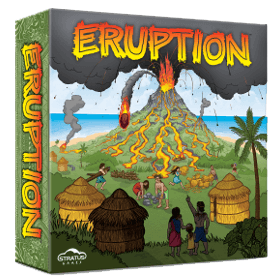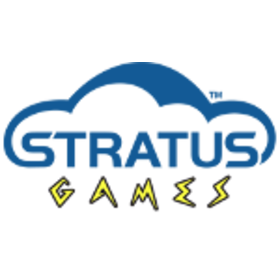akeruption
 akeruption é un xogo deseñado por Chris James e publicadoStratus Games.
akeruption é un xogo deseñado por Chris James e publicadoStratus Games.
Número de xogadores: 2 - 6
Duración do xogo: 58 mn
Complexidade: 2 / 5
Xoga akeruption e outros 1223 xogos en liña.
Non son necesarias descargas - xogad directamente dende o teu navegador.
Cós teus amigos e miles de xogadores do mundo enteiro.
De balde.

Xoga akeruption e outros 1223 xogos en liña.
Non son necesarias descargas - xogad directamente dende o teu navegador.
Cós teus amigos e miles de xogadores do mundo enteiro.
De balde.

Sumario de regras
The inhabitants of the villages surrounding a dormant volcano were happily living in peace until — KABOOM! — the old volcano sprang back to life, unleashing rivers of molten lava in every direction and blasting volcanic rock into the sky. The villages, now faced with destruction, must do whatever they can to protect their homes from the incoming surge of lava.
Your village is about to burn up — can you take the heat?
Overview
Players control villages that are threatened by an erupting volcano. Protect your village by placing lava tiles and building walls strategically, while also trying to direct lava toward the other villages to gain valuable action cards. The player whose village is at the lowest temperature at the end of the game, wins.
Turns
Do the following on each turn, in order:
1) Assess damage - your village heats up 20 degrees on the Burn Meter for each lava flow entering your village that is not blocked by a wall. For each lava flow that is blocked by a wall, roll the dice; if the lava (orange) wins the roll, your village heats up 10 degrees and the wall is discarded. If the wall is wood, add 1 point to the white die; if the wall is stone, add 2 points to the white die. Lava (orange) wins ties.
2) Draw and place a lava tile - place the tile so that all lava flows and grassy areas connect properly to other tiles. If you place a tile on a resource space, you gain a wall of that material. If you place a tile next to any village on the board, you draw an action card for each lava flow touching the village. If you want to place a tile next to a lava flow that is blocked with a wall, you must roll the dice and the lava must win the dice roll (or else you have to place the tile elsewhere).
3) Play as many action cards as desired - you can only keep a maximum of 3 Action Cards at the end of your turn. To play a card, discard it and either carry out the effect shown on the card or retrieve a wall of the material shown (you cannot do both). You can also optionally discard 2 cards to gain an additional tile placement.
4) Build a wall (optional) - place a wall piece (of any material) on the border next to your village or on a specific lava flow on the board.
Burn Meter
As a village heats up on the Burn Meter, the player who owns the village gains additional abilities in each Danger Zone.
Danger Zone 1 - the player may build an extra wall on his turn.
Danger Zone 2 - the player may draw an Action Card AND build an extra wall on his turn.
Danger Zone 3 - the player may place an extra Lava Tile AND draw an Action Card AND build an extra wall on his turn.
The first player to enter each Danger Zone must place the corresponding Eruption tile. This tile can be placed anywhere on the board and does not have to connect to other tiles (it is its own source of lava). When this tile is placed, all other players increase in temperature by 30 degrees.
Ending the Game
The game ends when either of the following events occurs:
1) A village reaches the last space on the Burn Meter and remains there at the end of the turn. The remaining Lava tiles are removed from the board and the other players take one final turn.
2) The last Lava Tile is placed. The current player finishes his turn, and all players (including the current player) take one final turn.
The player with the lowest temperature on the Burn Meter wins. If two players tie, add three for every stone wall at your own village or in your stockpile, two for a wooden wall and one for a straw wall and reduce that figure by the number of lava streams reaching your village. The higher number wins.

